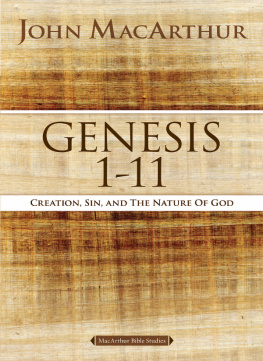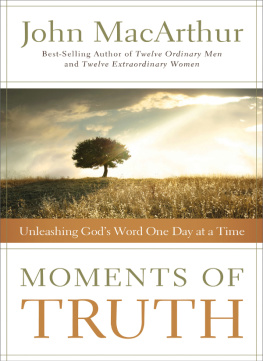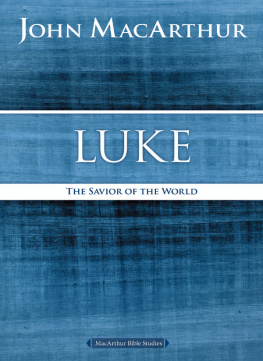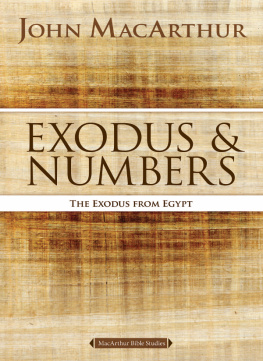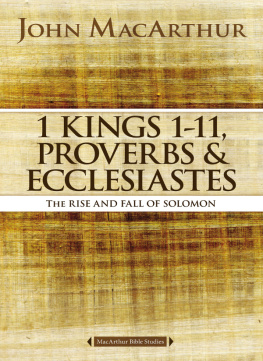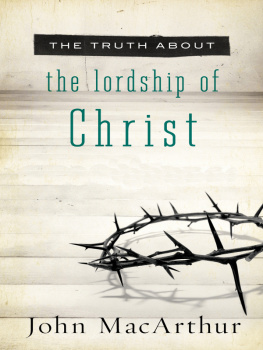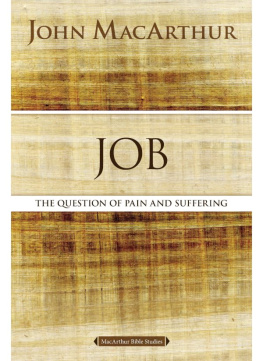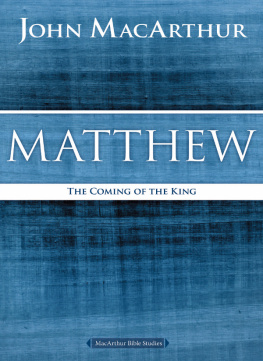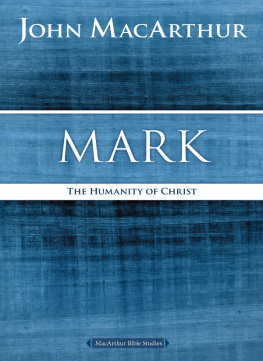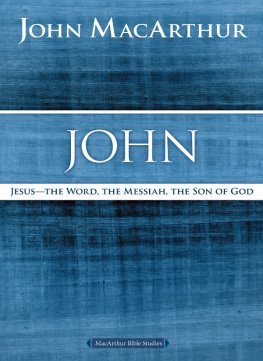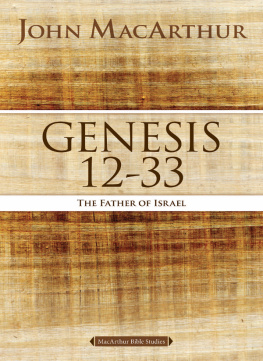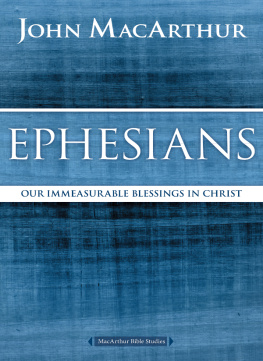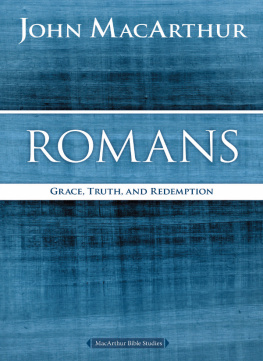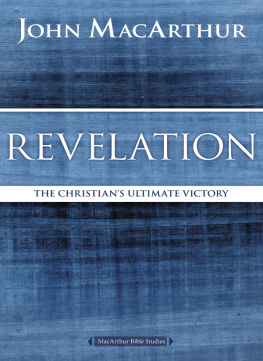MacArthur Bible Studies
Genesis 111: Creation, Sin, and the Nature of God
2008 by John MacArthur
All rights reserved. No portion of this book may be reproduced, stored in a retrieval system, or transmitted in any form or by any meanselectronic, mechanical, photocopy, recording, scanning, or otherexcept for brief quotations in critical reviews or articles, without the prior written permission of the publisher.
Published in Nashville, Tennessee, by Nelson Books, an imprint of Thomas Nelson. Nelson Books and Thomas Nelson are registered trademarks of HarperCollins Christian Publishing, Inc.
Originally published in association with the literary agency of Wolgemuth & Associates, Inc. Original layout, design, and writing assistance by Gregory C. Benoit Publishing, Old Mystic, CT.
Unleashing Gods Truth, One Verse at a Time is a trademark of Grace to You. All rights reserved.
Thomas Nelson, Inc. titles may be purchased in bulk for educational, business, fundraising, or sales promotional use. For information, please e-mail SpecialMarkets@thomasnelson.com.
Scripture quotations are taken from The New King James Version. 1982 by Thomas Nelson, Inc. Used by permission. All rights reserved.
Some material from the Introduction, Keys to the Text, and Exploring the Meaning sections are taken from The MacArthur Bible Commentary, John MacArthur, copyright 2005 Thomas Nelson Publishers.
ISBN 978-0-7180-3374-3
ISBN 978-0-7180-3480-1 (eBook)
CONTENTS
E very story, like every life, has a beginning. It is no surprise, then, to discover that the Bible begins the story of mankind at the very beginning, before there was life of any kind, and planet earth itself had just been shaped. Yet even then there was one lifethat of God Himself, who is Life.
As we go through the twelve studies in this book, we will discover that the Bible is not so much the history of mankind as the history of Lifethat is, Godand His love and grace toward mankind. The Bible is, in fact, the history of the Messiah: Gods Son, Jesus Christ, through whom God shows His grace. Gods love and grace toward His creation have always been at work to reveal the Messiah as our Redeemer. But to understand Gods plan of redemption, we must first understand that we need a Redeemer. That is what the early chapters of Genesis are all about.
In the twelve lessons that follow, we will examine the origins of the human race and discover exactly where suffering and death originated. We will also learn, among other things, how mankind came to be divided into different races and nationalities, why the world contains such a diversity of cultures and languages, and who committed the first murder. Through it all, we will learn a precious truth about the God who created all thingsHis love has been involved in human history from the very beginning! He is still involved in it today.
TITLE
The English title Genesis comes from the Septuagint (the Greek translation of the Bible) meaning origins. Genesis serves to introduce the Pentateuch (the first five books of the Old Testament) and the entire Bible. The influence of Genesis in Scripture is demonstrated by the fact that it is quoted more than 35 times in the New Testament, with hundreds of allusions appearing in both Testaments. The story line of salvation, which begins in Genesis 3, is not completed until Revelation 2122, where the eternal kingdom of redeemed believers is gloriously pictured.
AUTHOR AND DATE
While (1) the author does not identify himself in Genesis, and (2) Genesis ends almost three centuries before Moses was born, both the Old Testament and the New Testament ascribe this composition to Moses (see, e.g., Exodus 17:14; Numbers 33:2; Ezra 6:18; Nehemiah 13:1; Matthew 8:4; Mark 12:26; Luke 16:29; John 5:46). Moses is the fitting author in light of his educational background (see Acts 7:22), and no compelling reasons have been forthcoming to challenge his authorship. Genesis was written after the Exodus (c. 1445 BC) but before Moses death (c. 1405 BC).
BACKGROUND AND SETTING
The initial setting for Genesis is eternity past. God, by willful act and divine Word, spoke all creation into existence, furnished it, and breathed life into a lump of dirt that He fashioned in His image to become Adam. God made mankind the crowning point of His creation; i.e., His companions who would enjoy fellowship with Him and bring glory to His name.
The historical background for the early events in Genesis is clearly Mesopotamian. While it is difficult to pinpoint precisely the historical moment for which this book was written, Israel first heard Genesis sometime prior to crossing the Jordan River and entering the Promised Land (c. 1405 BC).
Genesis has three distinct sequential geographical settings: (1) Mesopotamia (chapters 111); (2) the Promised Land (chapters 1236); and (3) Egypt (chapters 3750). The time frames of these three segments are: (1) creation to c. 2090 BC; (2) 20901897 BC; and (3) 18971804 BC. Genesis covers more time than the remaining books of the Bible combined.
HISTORICAL AND THEOLOGICAL THEMES
In this book of beginnings, God revealed Himself and a worldview to Israel that contrasted, at times sharply, with the worldview of Israels neighbors. The author made no attempt to defend the existence of God or to present a systematic discussion of His person and works. Rather, Israels God distinguished Himself clearly from the alleged gods of her neighbors. Theological foundations are revealed, which include God the Father, God the Son, God the Holy Spirit, man, sin, redemption, covenant, promise, Satan and angels, kingdom, revelation, Israel, judgment, and blessing.
Genesis 111 (primeval history) reveals the origins of the universe (the beginnings of time and space) and many of the firsts in human experience, such as marriage, family, the Fall, sin, redemption, judgment, and nations. Genesis 1250 (patriarchal history) explained to Israel how they came into existence as a family whose ancestry could be traced to Eber (hence the Hebrews; see Genesis 10:2425) and even more remotely to Shem, the son of Noah (hence the Semites; see Genesis 10:21). Gods people came to understand not only their ancestry and family history but also the origins of their institutions, customs, languages, and different cultures, especially basic human experiences such as sin and death.
Because they were preparing to enter Canaan and dispossess the Canaanite inhabitants of their homes and properties, God revealed their enemies background. In addition, they needed to understand the actual basis of the war they were about to declare in light of the immorality of killing, consistent with the other four books that Moses was writing (Exodus, Leviticus, Numbers, and Deuteronomy). Ultimately, the Jewish nation would understand a selected portion of preceding world history and the inaugural background of Israel as a basis by which they would live in their new beginnings under Joshuas leadership in the land that had previously been promised to Abraham, their original patriarchal forefather.
Genesis 12:13 established a primary focus on Gods promises to Abraham. This narrowed their view from the entire world of peoples in Genesis 111 to one small nation, Israel, through whom God would progressively accomplish His redemptive plan. This underscored Israels mission to be a light for the Gentiles (Isaiah 42:6). God promised land, descendants (seed), and blessing. This threefold promise became, in turn, the basis of the covenant with Abraham (see Genesis 15:120). The rest of Scripture bears out the fulfillment of these promises.
On a larger scale, Genesis 111 sets forth a singular message about the character and works of God. In the sequence of accounts which make up these chapters of Scripture, a pattern emerges that reveals Gods abundant grace as He responded to the willful disobedience of mankind. Without exception, in each account God increased the manifestation of His grace. But also without exception, man responded in greater sinful rebellion. In biblical words, the more sin abounded the more did Gods grace abound (see Romans 5:20).
Next page
